#linear history
Explore tagged Tumblr posts
Text
youtube
TODAY IN PHILOSOPHY OF HISTORY
Saint Augustine on the Two Cities
Wednesday 13 November 2024 is the 1,670th anniversary of the birth of Saint Augustine (13 November 354 - 28 August 430), who areas born Aurelius Augustinus in Thagaste, in the province of Numidia, then part of the Roman Empire, now part of Algeria, on this date in 354 AD.
Saint Augustine has been one of the most influential figures in Western Christendom, named a father and a doctor of the church, and whose pervasive influence can be seen in philosophy of theology. But while his City of God has been read for more than a thousand years, and the providential conception of history he propounded continues to be influential, his philosophy of history remains underappreciated to this day.
Quora: https://philosophyofhistory.quora.com/
Discord: https://discord.gg/r3dudQvGxD
Links: https://jnnielsen.carrd.co/
Newsletter: http://eepurl.com/dMh0_-/
Text post: https://geopolicraticus.substack.com/p/saint-augustine-on-the-two-cities
Video: https://youtu.be/5FfWfxWqlnA
Podcast: https://spotifycreators-web.app.link/e/LaLWxmh1vOb
#youtube#philosophy of history#Saint Augustine#Augustine of Hippo#City of God#Civitas Dei#providentialism#time#eternity#linear history#cyclical history
1 note
·
View note
Text
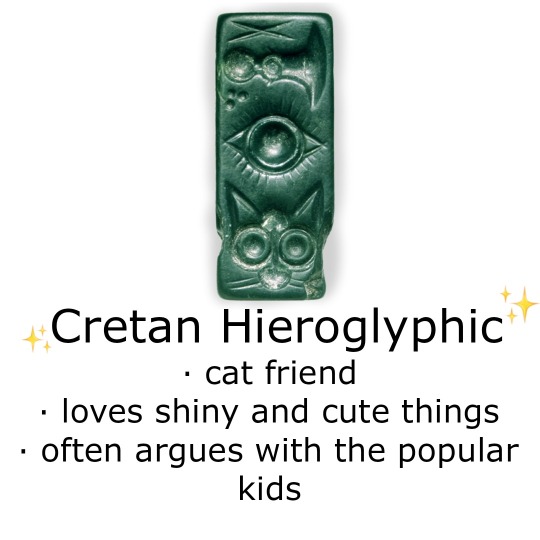
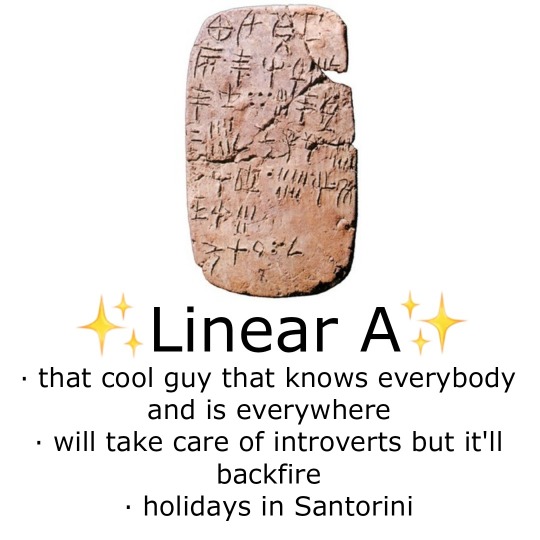


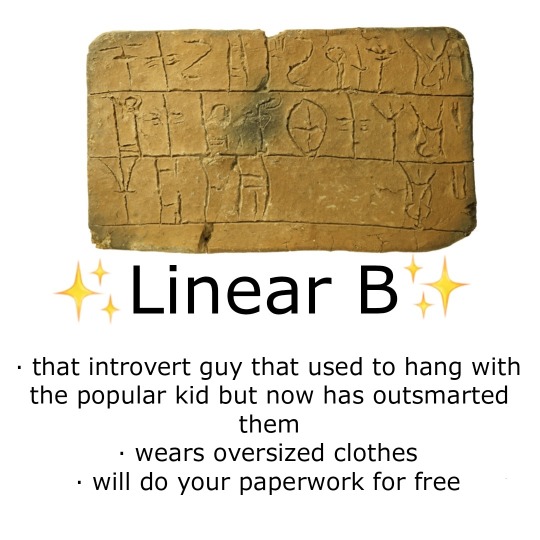

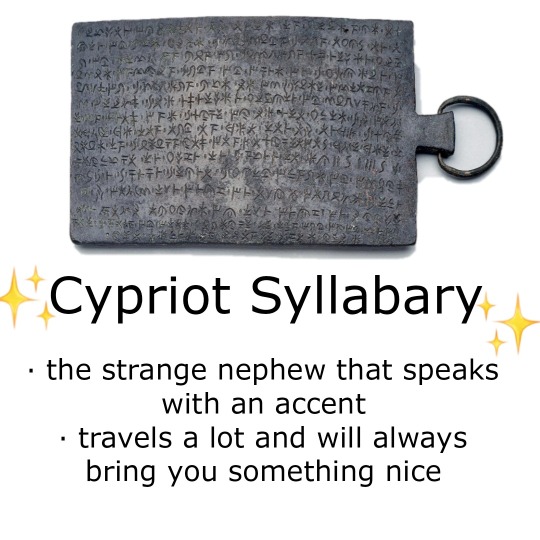
✨ tag yourself ✨ but with Aegean Scripts! Mainly Bronze Age, with a sprinkle of Iron Age (Cypriot Syllabary).
#tagamemnon#ancient greece#crete#minoan#scripture#history#classics#bronze age#cretan hieroglyphic#linear a#phaistos disc#linear b#cyprominoan#cypriot Syllabary#arkalochori axe#archaeology#tag yourself
3K notes
·
View notes
Text
I have the confidence of those men that think they could land an airplane but instead I just feel like I could be the first person to decode Linear-A if I really put my mind to it
776 notes
·
View notes
Note
Do you have any information on the Seppala sled dogs? I've seen some breeders claiming to have them but idk. The most "legit" kennel I saw apparently stopped their program a long time ago and let their dogs age out according ti their website. Their dogs looked lankier and leaner compared to Siberian huskies and had taller, close-set ears, they looked pretty neat. How much did they differ from their Sibe cousins & Chukchi laika ancestors? Are any of them still around today? Did they get absorbed into the Alaskan husky population, like the native Alaskan village dogs?
It's not my breed of choice so I probably don't have the most nuanced information, but they're basically just another breed of working sled dog.
After the Serum Run, Leonard Seppala toured with his dogs in the lower 48. It is during this time that we start seeing the beginnings of the modern Alaskan Malamute, the Siberian Husky, and the Seppala Siberian Sled Dog as all three programs owe some or much of their foundation from dogs Seppala brought with him.
You see, while the Siberian Husky and Seppala people like to think that Leonard Seppala had some sort of strict vision or plan of what he wanted to breed because he was amongst the first to import dogs from Siberia (and is certainly responsible for their fame as racers), many of his dogs were of mixed heritage. Togo himself was a quarter malamute (lower case here to indicate 'malamute' as it was prior to Kennel Club registration, a catch all name for indigenous coastal sled dogs at the time) and so were many of Seppala's dogs:

Seppala even gifted Yukon Jad, the father of the first registered litter of Alaskan Malamutes, to Eva Seeley at the time. The Seeley's owned Chinook Kennels in New Hampshire and here is where things start getting complex. Chinook Kennels bred both Alaskan Malamutes (Seeley's pet project, breeding dogs for Antarctic expeditions), as well as Siberian Huskies from additional stock she had acquired from Seppala. There is a rumor, with some truth behind it, that she would classify a dog as a 'malamute' if it had brown eyes, and a Siberian Husky if it had blue eyes.
Meanwhile Seppala went on to partner with Elizabeth Ricker in Poland Springs, Maine (who was Togo's final owner before his death) to form a different kennel. This one focused strictly on racing dogs. Again, descended from the dogs Seppala had brought to the lower 48. When this kennel disbanded, several of the dogs in Maine went to Harry Wheeler in Quebec who kept them in an extremely closed gene pool until the 1950s (descended from 9 dogs total yikes...). It is around this time that things start dispersing. There begins to be some crossover with the Seppala and Working Siberian Husky gene pools at this time (if you want to get really thick in the weeds read this). Many Working Siberians have Seppala heritage and vice versa because of this. Non-working bloodlines also have crossover to the Poland Springs dogs as well, but less often. There are a TON of Siberian Husky, Working Siberian Husky, and Seppala Siberian Sled Dog bloodlines, some of different percentage of mixture. But does it matter that much when all three breeds have origins in the exact same small group of dogs?
Ultimately the answer of why it matters to some comes down to breed politics and the way kennels clubs are structured, often failing to prioritize working aptitude over physical appearance. There were disagreements over how dogs descendent from the Seppala dogs should continue or how to best uphold, what Seppala wanted out of his dogs (which was to win races, but i digress...), and a lot of MASSIVE hatred for Eva Seeley (like they hate the idea that malamute might be in dogs from her kennel but Seppala himself was crossing Siberians and Malamutes before this time period...). Ultimately, Seppala Siberian Sled Dog people conclude that a Seppala is ONLY a Seppala if it descends only from dogs of Leonard Seppala OR dogs imported from Russia (there are major differences between Indigenous Russian sled dogs and Seppala Siberian Sled Dogs imo, but I won't get into that here in too much detail bc I'm glad they're outcrossing as the SSSD is very in need of genetic diversity). They usually have a big focus on working their dogs and eschew traditional kennel clubs (The Seppala Siberian Sled Dog is registered as a breed only with the Continental Kennel Club, the same 'Kennel Club' that will register anything with four legs as a breed so...).
Now I think a LOT of SSSD people place a huge amount of energy into what "looks" like an SSSD compared to a working Siberian Husky and vice-versa, which is funny considering their attitudes on conformation showing as well as their willingness to outcross to unrelated dogs. They love making the 'cookie cutter show dog' argument against conformation bred Siberians while also having a breed of dog ultimately descended from the same stock, that has been intensely inbred in its history (even though they will bemoan the registered Siberian's lack of genetic diversity...i would be interested in seeing COI comparisons honestly) and has a very distinct look. Again, so much of this comes down to early breeder's historical beef with Siberian Husky folks which I think would be much better for both sides to let go of because really what this is is breed split at the most granular. I can guarantee Russian sled dogs folks that don't use registered breeds specifically do not care to get this fucking specific. Does it work well? Cool, it's sled dog.

(Half Yakutian Laika/Seppala dog on the left, full Seppala dog on the right for comparison, but god forbid a registered Siberian Husky is bred into the bloodlines despite...everything).
Anyways here are some actual indigenous russian sled dogs:





And Leonard Seppala's Dogs:

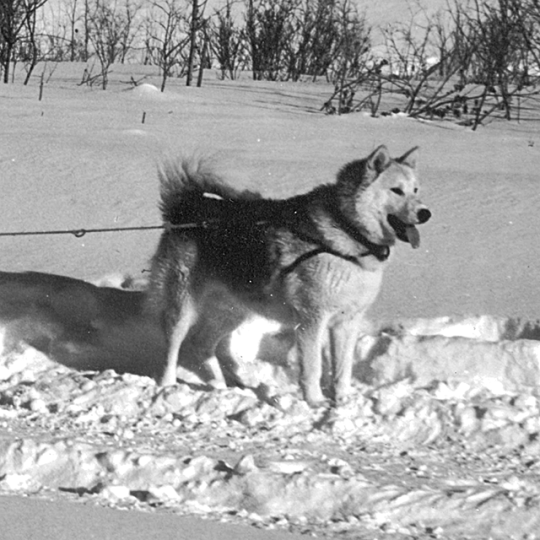


(SSSD folk will often wax poetical about their dogs resemblance to Scotty, but notice how unusual Scotty looks compared to the other siberian imports Seppala owned (he did have an import Dam, but father? who knows).)
Some Alaskan Husky lines do have Seppala in their heritage (I believe the Hedlund Husky project uses them infrequently as outcrosses), but the Seppala Siberian Sled Dog is pretty insular within itself and the people still breeding it. There are not a lot of breeders, but there are def some of them doing really interesting stuff with their dogs (despite my beef for the attitude and breed split i still have a deep respect when people are doing cool stuff and open to outcrossing etc.). Poland Springs Seppalas is in Alaska right now doing a recreation of the original serum run to celebrate the serum run's 100th year. I think that's pretty darn cool.
#dogblr#dog history#seppala siberian sled dog#alaskan husky#siberian husky#alaskan malamute#history dog#faq#please correct me if i'm wrong on any of this but if you need the TLDR it's just: INSULAR BREED BEEF#which is funny to me because working sibes exist. i know show bred sibes who are titled in work and race lol#the obsession with purity and the beginnings of breed beef with this really gets me#its a working bred dog and its history is not going to be linear yall
55 notes
·
View notes
Text
Mycenaean Greek
(and examples of lexical evolution to Modern Greek)
Mycenaean Greek is the most ancient attested form of the Greek language (16th to 12th centuries BC). The language is preserved in inscriptions of Linear B, a script first attested on Crete before the 14th century BC. The tablets long remained undeciphered and many languages were suggested for them until Michael Ventris, building on the extensive work of Alice Kober, deciphered the script in 1952. This turn of events has made Greek officially the oldest recorded living language in the world.
What does this mean though? Does it mean that a Modern Greek could speak to a resurrected Mycenaean Greek and have an effortless chat? Well obviously not. But we are talking about the linear evolution of one single language (with its dialects) throughout time that was associated with one ethnic group, without any parallel development of other related languages falling in the same lingual branch whatsoever.
Are we sure it was Greek though? At this point, yes, we are. Linguists have found in Mycenaean Greek a lot of the expected drops and innovations that individualised the Hellenic branch from the mother Proto-Indo-European language (PIE). In other words, it falls right between PIE and Archaic Greek and resembles what Proto-Greek is speculated to have been like. According to Wikipedia, Mycenaean Greek had already undergone all the sound changes particular to the Greek language.
Why was it so hard to decipher Linear B and understand it was just very early Greek? Can an average Greek speaker now read Linear B? No. An average Greek speaker cannot read Linear B unless they take into account and train themselves on certain rules and peculiarities that even took specialized linguists ages to realise and get used to. Here's the catch: Linear B was a script inspired by the Minoan Linear A, both of which were found in the Minoan speaking Crete. (Minoan Linear A inscriptions have yet to be deciphered and we know nothing about them.) The Mycenaeans (or was it initially the Minoans???) made only minimal modifications to produce the Linear B script and used it exclusively for practical purposes, namely for accounting lists and inventories. Linear B however was an ideographic and syllabic script that stemmed from a script that originally was not designed to render the Mycenaean Greek language, and thus it could not do it perfectly. In other words, the script itself does not render the Greek words accurately which is what made it extremely hard even for the linguists to decipher these inscriptions. Due to its limited use for utility and not for prose, poetry or any other form of expression, the Mycenaean Greeks likely did not feel compelled to modify the script heavily into some more appropriate, accurate form to cover the language's needs.
Examples of the script's limitations:
I won't mention them all but just to give you an idea that will help you then read the words more easily:
In the syllabic script Linear B, all syllable symbols starting with a consonant obligatorily have a vowel following - they are all open sylllables without exception. Linear B can NOT render two consonants in a row which is a huge handicap because Greek absolutely has consonants occuring in a row. So, in many cases below, you will see that the vowel in the script is actually fake, it did not exist in the actual language, and I might use a strikethrough to help you out with this.
For the same reason, when there are consonants together, at least one of them is often casually skipped in Linear B!
There were no separate symbols for ρ (r) and λ (l). As a result, all r and l sounds are rendered with the r symbol.
Exactly because many Greek words end in σ, ς (sigma), ν (ni), ρ (rho) but in Linear B consonants must absolutely be followed by a vowel, a lot of time the last letter of the words is skipped in the script!
Voiced, voiceless and aspirate consonants all use the same symbols, for example we will see that ka, ha, gha, ga all are written as "ka". Pa, va, fa (pha), all are written as "pa". Te, the are written as "te".
There are numerous other limitations but also elements featured that were later dropped from the Greek language, i.e the semivowels, j, w, the digamma, the labialized velar consonants [ɡʷ, kʷ, kʷʰ], written ⟨q⟩, which are sometimes successfully represented with Linear B. However, that's too advanced for this post. I only gave some very basic, easy guidelines to help you imagine in your mind what the word probably sounded like and how it relates to later stages of Greek, and modern as is the case here. That's why I am also using simpler examples and more preserved vocabulary and no words which include a lot of these early elements which were later dropped or whose decoding is still unclear.
Mycenaean Linear B to Modern Greek vocabulary examples:
a-ke-ro = άγγελος (ágelos, angel. Notice how the ke symbol is representing ge, ro representing lo and the missing ending letter. So keep this in mind and make the needed modifications in your mind with the following examples. Also, angel actually means "messenger", "announcer". In the Christian context, it means "messenger from God", like angels are believed to be. So, that's why it exists in Mycenaean Greek and not because Greeks invented Christianity 15 centuries before Jesus was born XD )
a-ki-ri-ja = άγρια (ághria, wild, plural neuter. Note the strikethrough for the nonexistent vowel)
a-ko-ro = αγρός (aghrós, field)
a-ko-so-ne = άξονες (áksones, axes)
a-na-mo-to = ανάρμοστοι (anármostoi, inappropriate, plural masculine. Note the skipped consonants in the script)
a-ne-mo = ανέμων (anémon, of the winds)
a-ne-ta = άνετα (áneta, comfortable, plural neuter, an 100% here, well done Linear B!)
a-po-te-ra = αμφότερες (amphóteres, or amphóterae in more Archaic Greek, both, plural feminine)
a-pu = από (apó, from)
a-re-ka-sa-da-ra = Αλεξάνδρα (Alexandra)
de-de-me-no = (δε)δεμένο (ðeðeméno, tied, neuter, the double de- is considered too old school, archaic now)
do-ra = δώρα (ðóra, gifts)
do-ro-me-u = δρομεύς (ðroméfs, dromeús in more Archaic Greek, runner)
do-se = δώσει (ðósei, to give, third person singular, subjunctive)
e-ko-me-no = ερχόμενος (erkhómenos, coming, masculine)
e-mi-to = έμμισθο (émmistho, salaried, neuter)
e-ne-ka = ένεκα (éneka, an 100%, thanks to, thanks for)
e-re-mo = έρημος (érimos, could be pronounced éremos in more Archaic Greek, desert)
e-re-u-te-ro-se = ελευθέρωσε (elefthérose, liberated/freed, simple past, third person)
e-ru-to-ro = ερυθρός (erythrós, red, masculine)
e-u-ko-me-no = ευχόμενος (efkhómenos or eukhómenos in more Archaic Greek, wishing, masculine)
qe = και (ke, and)
qi-si-pe-e = ξίφη (xíphi, swords)
i-je-re-ja = ιέρεια (iéreia, priestess)
ka-ko-de-ta = χαλκόδετα (και όχι κακόδετα!) (khalkóðeta, bound with bronze, plural neuter)
ke-ka-u-me-no = κεκαυμένος (kekafménos, kekauménos in more Archaic Greek, burnt, masculine)
ke-ra-me-u = κεραμεύς (keraméfs, kerameús in more Archaic Greek, potter)
ki-to = χιτών (khitón, chiton)
ko-ri-to = Κόρινθος (kórinthos, Corinth)
ku-mi-no = κύμινο (kýmino, cumin)
ku-pa-ri-se-ja = κυπαρίσσια (kyparíssia, cypress trees)
ku-ru-so = χρυσός (khrysós, gold)
ma-te-re = μητέρα (mitéra, mother)
me-ri = μέλι (méli, honey)
me-ta = μετά (metá, after / post)
o-ri-ko = ολίγος (olíghos, little amount, masculine)
pa-ma-ko = φάρμακο (phármako, medicine)
pa-te = πάντες (pántes, everybody / all)
pe-di-ra = πέδιλα (péðila, sandals)
pe-ko-to = πλεκτό (plektó, woven, neuter)
pe-ru-si-ni-wo = περυσινό / περσινό (perysinó or persinó, last year's, neuter)
po-me-ne = ποιμένες (poiménes, shepherds)
po-ro-te-u = Πρωτεύς (Proteus)
po-ru-po-de = πολύποδες (polýpoðes, multi-legged, plural)
ra-pte = ράπτες (ráptes, tailors)
ri-me-ne = λιμένες (liménes, ports)
ta-ta-mo = σταθμός (stathmós, station)
te-o-do-ra = Θεοδώρα (Theodora)
to-ra-ke = θώρακες (thórakes, breastplates)
u-po = υπό (ypó, under)
wi-de = είδε (íðe, saw, simple past, third person singular)
By the way it's killing me that I expected the first words to be decoded in an early civilisation would be stuff like sun, moon, animal, water but we got shit like inappropriate, salaried and station XD
Sources:
gistor.gr
Greek language | Wikipedia
Mycenaean Greek | Wikipedia
Linear B | Wikipedia
John Angelopoulos


Image source
#greece#history#languages#linguistics#greek#greek language#langblr#mycenaean greek#modern greek#greek culture#language stuff#vocabulary#linear b#mycenaean civilization
140 notes
·
View notes
Text
you know what's really funny just yesterday my contemporary history course went over the elections that brought the rise of nazism in germany and the march on Rome and violence that lead to fascism in italy. I'm really enjoying the historian experience of feeling like Cassandra from The Iliad
#[.txt]#gee guys this sounds really familiar to the Last Time but surely history is teleologic and progress is constant and linear right#bashing my head against a wall. at least i signed up for a leftist party this year and can /do something/ at least for my university#che dire. okay. tempo di andare a piratare i libri di gramsci
63 notes
·
View notes
Text
it's the way the season started out with crowley leaving the bookshop after a fight and the season ended with crowley leaving the bookshop after a kiss. it's the way it started out with crowley being offered to be a duke of hell and it ended with aziraphale being offered to be the supreme archangel.
it's the way the second episode started with crowley saying: "well i am a demon. maybe i'm lying", and it ended with crowley telling aziraphale: "well i am a demon. i lied."
it's the way the third episode started with crowley perching beside aziraphale on the armchair and across from an angel who was new to earth, and it ended with crowley telling gabriel: "it's always too late." it's the way the fourth episode started with the demon sent to take crowley's place getting aziraphale's help and it ended with aziraphale helping crowley move the plants back into the bentley
it's the way the fifth episode started with crowley being reluctant about the shopkeeper's association meeting and it ended with crowley rescuing everyone there. it's the way the sixth episode started out with crowley wandering around heaven and it ended with crowley refusing to go to heaven with aziraphale
it's the way they've moved in circles for the past thousands of years around each other, and the episodes move in circles too but not quite a perfect circle because they're still trying to figure out where they are between the lines but it's also the way aziraphale told crowley to look him in the eye and tell him that crowley wanted to kill job's children, and crowley lied to aziraphale about it because he wanted to see how far aziraphale would go along with a demon as forsaken as him, and it's the way crowley said no to god then
it's the way the season ends with crowley telling aziraphale to tell me you said no. and aziraphale couldn't. it's the way they both want to be with each other. it's the way aziraphale was the one who came to crowley first. it's the way the season starts with aziraphale dropping down to greet crowley who was standing there in the dark, and the season ends with aziraphale standing there going up and crowley driving away
#it's about history repeating itself#but in a different way each time#and maybe that's how change and growth and healing happen#in circles sometimes and not quite linear#but still there#especially in aziraphale's context#good omens#good omens 2#good omens spoilers#good omens 2 spoilers#aziraphale#crowley#ineffable husbands#this will probably make no sense to me in the morning but#i am STILL not okay and i needed to write thoughts down#neil was insane for this season#and i absolutely adore it
545 notes
·
View notes
Note
hello, i'm watching one hundred years of solitude thanks to your posts and finding it absolutely captivating. i'm interested to know what you like most about the story if you feel like sharing!
I’ve been completely steeped in the book for well over half of my life, so I’m the worst person to ask about the narrative of the show—when I watch it, my brain slots in the missing context almost as quickly as the input makes its way up my visual pathway. So much of my enjoyment is rooted in how attentively the show replicates Márquez’s visual and sensory descriptions, and how ambitiously it goes about translating the lyrical prose through pacing and cinematography.
#i don't know if this show will take off on here but it would be so fucking funny if it did#like i know this is the website where the foundation of critical thought is a handful of inane quotes about stories saving us all forever#parsing magical realism within a cultural & political context instead of mapping it onto whimsical peter pan bullshit challenge: IMPOSSIBLE#''is fernanda del caprio a SWERF-'' the greatest flamewar in the history of tumblr#romeoandjuliet1996#assbox#one hundred years of solitude#like. a successful adaptation of this book is going to look and feel different from a successful adaptation of a jane austen novel#and a cyclical chronicle is by orders of magnitude more challenging to get right than a non-linear story#i think if s2 matches the energy in s1 they can pull it off
32 notes
·
View notes
Text
Listen, listen. The Catholicism has to have come from SOMEONE for the next generation Targaryens to explain why Baelor and Naerys specifically were like that. Aegon III is too depressed to be an involved father + he died young, Vizzy T was a child having children, Larra is ABSENT. This leaves Jaehaera only.
#Jaehaera comforting Naerys after she was forced to be a childbride#listen it makes sense. it makes sense.#she raises the next gen practically by herself and what does she get. does history acknowledge her efforts at all.#her daughter names her son after the man who had Jaehaerys slaughtered like a dog#Literally the Targaryen line would go on by Vizzy II anyway not Aegon III#Jaehaera living adds much so more context while not disrupting the family tree#plus she's related to daemon blackfyre who's descent from both lines#now in present time. There will be a second Dance between Daenaerys and Young Griff#who's a Blackfyre obviously but also has Aegon II's blood.#time is not linear it moves in circles!!!!#asoiaf#hotd
29 notes
·
View notes
Text


#the odyssey along with the Iliad are The literary works that ancient greek culture-- arts worldview cosmology morality-- developed around#as well as works that created the idea of a greek identity and an aegean/mediterranean history from the fragmentary traditions and memories#of the bronze age and earlier that managed to survive through the fucking dark age#if chaucer and the bible had a baby that's how important these works were for greek identity and understanding of themselves and the world#the odyssey on it's own is an incredible preservation of regional folk tales and trickster culture heroes#and a priceless glimpse into ancient greek understanding of their past as well as the political and social structures of the archaic period#and also an incredibly pioneering narrative structure that mimics the circular travels of its protagonist with its non-linear format#if a forgettable children's book series that doesn't even represent the mythology well is That for you then you need help frankly#and if it's not then shut up about it already#(just say you're a 28 year old with a 4th grade reading level and go)#like I dislike these books for a variety of reasons but it's takes like this that make me HATE them#SHUT UP about these GODDAMN BOOKS#greek mythology#ancient greece#anti pjo#anti percy jackson#lore and more
23 notes
·
View notes
Text

Truck-kun continuing to be the biggest homophobe.
#i'll turn back this time#history 3: make our days count#the effect#etc etc#this is why we have trauma#is this show going to be linear from this point?#or are we getting a mystery spot style where poor shi wen gets hit by a truck five of six eps?#time will tell
9 notes
·
View notes
Text
Friday 11 October 2024
Grand Strategy Newsletter
The View from Oregon – 310
Permutation of Cyclicality and Linearity
…in which I discuss linear and cyclical history, reductivist formulations of history, Nietzsche’s eternal return, inter-definability of permutations, temporal iterations, uniqueness in time, repetition, plate tectonics, and the supercontinent cycle…
Substack: https://geopolicraticus.substack.com/p/permutations-of-cyclicality-and-linearity
Medium: https://jnnielsen.medium.com/permutations-of-cyclicality-and-linearity-1dead7293ef4
Reddit:

0 notes
Text
I've been thinking about the setting of my TUGS au, the prequel to casa tidmouth, and by extention I began thinking about the show TUGS itself.
it's kind of depressing to know that TUGS is most likely set during the years RIGHT before world war 2. I remember watching a TUGS iceberg video a long time ago, maybe last year-ish. after a series of callbacks and alludes to the little environmental details right at the end of the video, the creator said that the show is possibly not set during the 1920s, but the 1930s, nearing another war period, and that's why I've changed the era of what this AU is set in many months ago.
mitton and cardona claimed that the show is set during the "booming era" of the 1920s, but I can't help but think that maybe the 1920s isn't the most fitting era with how the tone of the show is.
the 1930s setting really does make sense though -- the atmosphere in TUGS is much more, I dunno how to exactly say it, gloomy? serious? it's still a mostly lighthearted kids show, but, to quote some things indirectly from the iceberg video; what's with the munitions? the flammable barges? johnny cuba? the constant mention of broken ships? characters dying right on the screen in such a macabre fashion? burke and blair's whole job? then my mind thought about the star tugs and z-stacks, their relationship and purpose and how it ties to the pre-ww2 feeling of the story.
the conflict between the star tugs and z-stacks isn't fueled by personal grudge against each other. I apologize for comparing TUGS to ttte, but in comparison to its sister series where the engines of sodor have personal banter against each other selfishly, still manage to fool around during their jobs, get into accidents due to their own hubris, and end the day where they learned their lesson, TUGS is much different. they're just there to work and carry through their contracts. they still banter with each other but they know their priorities. they are also driven by their conscience and rationale, not just some "oh he made fun of me so I'm not gonna help him out. I'm bigger and more important so I refuse to do this job and go back to my berth".
zorran dislikes the star tugs but knows that the contracts are much more important and he is willing to work with them if it means the job will be done. top hat, despite his personal distaste for anything smelly, QUICKLY changes his mind about lord stinker and works with him to save the goods engine. zebedee is a character more driven by his personal view on what's good or bad -- he helped the star tugs push princess alice back into place and showed concern when ten cents was pushing the oil barge to the sea, but there's a part of him that's definitely concerned for his own well being.
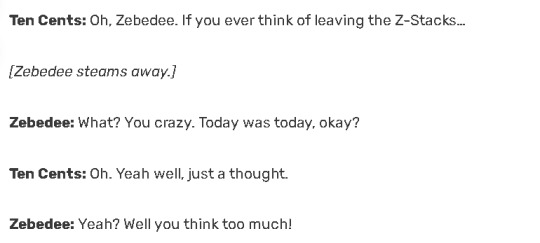
they have their personal opinions on both their teammates and their rival company's tugboats, but they know better than to let those feelings get in the way. not working means their presence as tugboats will be jeopardized.
these points, added to the very high possibility that TUGS is set during the late 1930s, creates another layer to the overall murkier feeling of the show. the characters know the times are dire. the characters know that they have contracts to go through. they know that something big is coming. they've went through world war 1! with how bluenose and the navy inserted their presence in bigg city port, there's also an idea that there's gotta be at least one character with a sense of foreboding amidst the business.
I also reckon they've grown some kind of fondness (???) for their rival company? it's like when there's a kid at school who keeps annoying you, but next day they're not there and you got a bit worried on where they might be. the two factions don't necessarily like each other, but their rival has formed a place in their normalcy that to get rid of them entirely is not going to do any good, really.
so yeah. that's all I have in mind right now.
#zin.txt#this is tugs#oh and to answer. the AU is gonna be set in around 1938#the stories aren't linear per se? probably like casa tidmouth where the story spans for the whole summer of 1999#especially there's regatta (summer) and bigg freeze (winter) like at least it'll take place a full year#oh boy. time to do some MORE history reading#also I just realized something#ten cents sunshine and zip are late teens in the late 1930s#and there's a war coming#uh. I'd rather not think too much about the implications.#fortezza bigg city
57 notes
·
View notes
Text
don't understand why some think the pre-emptive salvation and sanctification of Mary by Christ's sacrifice is so unreasonable when the Old Testament assumptions into Heaven exist like could people be pre-emptively saved by Christ's sacrifice or not
#just bc its uncommon and Marys salvation is unique??? Marys role in salvation history itself is unique dude#God is eternal and outside of time just bc He entered into linear time doesnt mean He is bound by it
58 notes
·
View notes
Text
hey uh not for nothing but it would be so much easier to talk about the ableism issues with how jack is treated/depicted if you guys could learn to understand that bigotry doesn’t necessarily have to be intentional and outright cruel for it to be harmful. that sometimes it is accidental or made with good/harmless intentions but that doesn’t make it less bigoted in the long run. If we could just move past that one square we could actually have a conversation 👍
#if I went into the full depths of how normalized and perpetuated ableism is—#—or the general fact that disabilities both physically and mentally are incredibly misconstrued and understudied and misrepresented#and underrepresented and all these other things that make it incredibly difficult to be disabled in almost every space possible#sad to see it in fandom spaces too but well. history is history and what’s embedded is embedded#progress is not linear and it is not a quick fix either but if we could just Get This In Out Heads and actually talk it out .#maybe we could get somewhere#I haven’t been very strong with my posts lately but trust me it’s still very important to me#anyways . whatever#ciao ciao#cal.txt#spn#spn fandon#jack kline#autistic jack kline#autistic representation#fandom ableism#etc etc whatever else#Please just Google infantilization and maybe rewatch the show until you can pick up on how jack is Not seen as a child in canon#pleass im so tired of this. it’s been seven fuckinf years
16 notes
·
View notes
Text
Linear Algebra Lecturer (flipping a coin and explaining why Markov Chains exist): '"...the fact that these converge means God exists.'"
#bitches be crazy#history is strange#university#student life#college#school#student#quotes#quote blog#college quotes#university quotes#dialogue#math#math class#linear algebra
8 notes
·
View notes